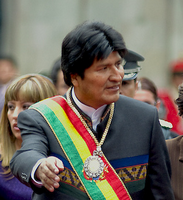Last week's nationwide protests by Bolivian bus drivers were the latest in a series of demonstrations that have become a massive administrative and political headache for Bolivian President Evo Morales. Bolivians have developed a growing list of grievances against the beleaguered leader and are taking them to the streets -- as well as to the mines and railways -- across the country with greater frequency in 2011.
Since winning re-election by a landslide in December 2009, Morales has been under mounting pressure from both ends of the spectrum of Bolivian society -- the wealthier elites in the east and the impoverished indigenous population in the west -- as well as from traditional political rivals. They are pushing the administration to institute labor reform, increase wages, improve security, keep prices of basic household necessities like food and gas in check and develop infrastructure.
Although many of these lines of tension have long been present in Bolivia, the scale and scope of the internal strife that has taken hold of the country so far this year have been surprising.

